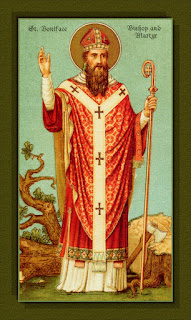He traveled to Frisia, attempting to convert the Saxons there, with little success. Returning to England, he discovered that he had been chosen to replace the recently deceased abbot, but he preferred to continue his efforts to evangelize pagans.
On a trip to Rome in 718, he met with Pope Gregory II, who gave him the Name "Bonifatius" meaning "good fate" or "auspicious." Gregory made him a bishop, but instead of granting him a diocese sent him to Germania—where the spent the rest of his life, attempting to convert the area. His job was made more difficult by the war currently being fought between Charles Martel and the Frisian king, Radbod. (Radbod died in 719, but Frisia continued to oppose the Franks, right up through the Massacre of Verden in 782.
Fortunately for Boniface, Charles Martel supported his mission, as did succeeding Carolingian rulers. Boniface's goal of destroying as many pagan symbols as he could probably dovetailed with the Frankish goal to subjugate the Saxons and see them ruled by Frankish culture.
A second trip to Rome in 732 saw him receive the pallium as archbishop from Pope Gregory III. That same year, Charles Martel defeated the Umayyad Caliphate at the battle of Tours, after which he rewarded many churches and monasteries with lands. This act, unfortunately, led to church officials benefitting materially, a practice which Boniface deplored. Martel, however, did establish four dioceses in Bavaria with Boniface as their archbishop.
Boniface had one of his disciples found a monastery at Fulda, where Boniface was interred when he died in 754.
The axe you see in the picture above is pretty ubiquitous in portrayals of Boniface because of a particular act of his, the felling of the Donar Oak, a tree sacred to pagans. And speaking of Boniface and trees, did you know that some credit him with the invention of the Christmas Tree? I think tomorrow would be a good time to tell you about that.
